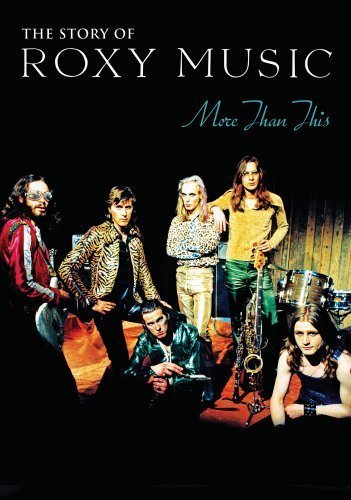You can’t utter the words “art rock” without mentioning Roxy Music. But there’s “more than this…” much more, in fact, to the dynamics, inner workings and influence of Roxy Music than you may think. Which makes the DVD More Than This: The Roxy Music Story an essential documentary for anyone with a passing interest in not only art rock, but glam rock, punk rock, alternative rock, progressive rock, dance music — and the band that had a hand in shifting and shaping all of them.
Any time you get can get Bono to say a few words on your behalf, you know you’re in for a sweet ride. Additional commentary from band members Bryan Ferry, Brian Eno, Andy Mackay, Phil Manzanera, Paul Thompson and Eddie Jobson, as well as Siouxsie Sioux (the Banshees), Steve Jones (the Sex Pistols), Nile Rodgers (Chic), John Taylor (Duran, Duran) and assorted associates and accomplices, arms the DVD with all the necessary components of cooperation. As the Roxy Music story unfolds rather gallantly, it’s hard not to become entranced by each element of the journey — from their artistic, avant-garde beginnings to their cosmopolitan, sophisticated look and feel bolstered by the array of glamour girls gracing the album covers.
Roxy Music grew out of Bryan Ferry’s desire to combine the visual expanse of art with modern music. The like-minded Andy Mackay, who played oboe and saxophone, joined up with Ferry and invited his friend Brian Eno to record them. During the session, Eno had “a go” at Mackay’s synthesizer, and was instantly recruited to add electronic embellishments to the mix. Guitarist Phil Manzanera and drummer Paul Thompson answered ads and the original lineup was complete (original bassist Graham Simpson doesn’t figure much into the story; in fact, it’s a standing joke that Roxy Music has ran through dozens of other bass players without making any of them permanent members). Roxy Music was on its way to becoming one of rock’s most risqué and challenging acts.
How the band broke from the ranks, establishing its own special flavor of panache,
reeling in critics, fans and adventurous souls alike, is at the heart of the story. With Ferry as the focal point, visionary and director, Eno made a swift exit after the second album. Both graciously admit their strong heads and creative ambitions made it difficult to continue to work together, but nary a harsh word is spoken about anyone. For all the theatrics that went into their presentation, dramatics are virtually absent in the Roxy Music organization (maybe that’s why they were never profiled on Behind The Music). Even super virtuoso Eddie Jobson, who replaced Eno and played on three of the group’s albums, knew his place in Roxy Music.
Throughout the 70s and 80s, Roxy Music were able to ingratiate themselves within the contemporary mainstream. The punks loved them, the new wavers copied them, disco bands like Chic were inspired by them. They had an unlikely hit with a cover of John Lennon’s “Jealaous Guy,” a few months after the former Beatle’s tragic assassination, and their final (so far) studio album Avalon in 1983 was successful at a time when many of their contemporaries were out of vogue.
The DVD doesn’t delve on why the band didn’t continue working together in the late 80s and 90s, instead jumping right into a 2001 reunion with Ferry, Mackay, Manzanera and Thompson. Footage from a recording session with Eno following the reunion reveals the band began work on a new album fans are still waiting for. Subsequent reunions are not explored, although there are three live performances — “Both Ends Burning,” “Editions Of You,” and “Do The Strand” — from a 2006 London concert featured in the Bonus section of the DVD, which also includes additional interviews focusing on the notorious album covers, the band’s uniique chemistry, and other fascinating tidbits. More Than This: The Roxy Music Story has little dirt to offer, but more than its share of musical history, fashionable innovations and incredible sounds.
~ Shawn Perry




















